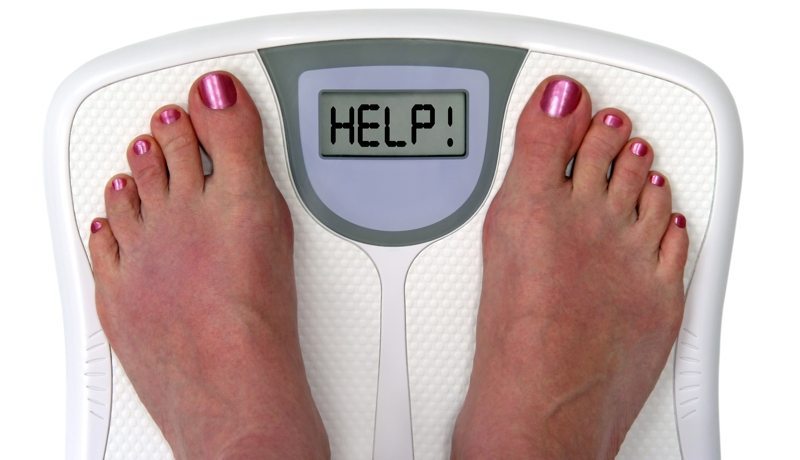Menopausal Weight Gain. It’s Real, It’s Necessary And It’s Stubborn

Menopausal weight gain? Of all the menopause signs, the weight gain is the one I find the most distressing and the most pervasive.
And it’s all about my expanding waistline.
I hate that it’s now almost as hard to bend over and paint my toenails as it was when I was pregnant. Additionally, I hate that when I go to yoga and do forward bends and twists there’s a big wad of flesh in my way. As well as that I hate that when I’m standing and look down I see my stomach instead of my feet. Besides that, I hate that when I’m sitting I can count my rolls and I’m not telling you how many. And I hate how I have back fat. Finally, I hate how every year I outgrow my clothes – not everywhere – just around the bits where there are buttons or zips that have decided to part company.
As a result, I feel guilty. I’m a strong woman and I should be able to control my weight. I must be eating too much or not exercising enough. The self-chastising is never-ending; I’m too lazy, not disciplined enough, it’s all my fault. I try the odd diet or health tip being promoted by someone (who inevitably hasn’t reached menopause yet). And none of this makes the slightest bit of difference. Oh but wait – it does – I actually gain more weight.
Menopause without weight gain
Imagine my curiosity when I stumbled across a book called “Menopause Without Weight Gain” by Debra Waterhouse. This book is wonderful. I’m reading it greedily, nodding my head all the way. Yes, you understand me Debra, yes I understand what you are saying, yes I’m going to follow your advice.
What is her message?
Stop dieting, exercise more often and focus on self-acceptance and health.
Debra had me from the first paragraph of her first chapter:
“Menopausal weight gain. It’s real, it’s necessary, and it’s the most stubborn weight gain you’ll ever experience. As a matter of fact, it’s more stubborn than the weight you gained during pregnancy. And it’s as essential as the weight you gained during puberty. It also starts when you are younger than you’d ever imagine and lasts longer than you’d like.”
Just these words were enough to feel my guilt sliding off my shoulders.
She tells us that each and every one of us has 30 billion fat cells. However, a woman’s fat cells are physiologically different from a man’s – larger, more active and resistant to dieting. Plus they enter the menopausal transition before we do.

Diagram from “Menopause Without Weight Gain” by Debra Waterhouse.
As soon as our fat cells detect a slightly lower level of estrogen, they come to our aid to produce estrogen for us. They increase their size, number and ability to store fat.
The fat cells in our waist grow the largest because they are better equipped to produce estrogen than the fat cells elsewhere on the body i.e your hips, buttocks or thighs. What’s more, the larger our abdominal fat cells become, the more estrogen will be produced. Therefore, the more relief from menopausal signs leading to the observation that leaner women have the most difficulty with the transition.
In other words, the weight gain we hate is actually good for us. Our fat cells have an important job – to manufacture estrogen and balance our bodies during the transition.
So why is it that women are reporting more menopausal stress than ever before? And obesity is on the rise with women weighing more than ever before?
Debra’s answer: we are preventing our fat cells from doing their important balancing job by our obsession with dieting. They have been so busy fighting our weight loss attempts they have lost their capacity to manufacture estrogen and restore our bodies’ balance. Compared to when our mothers went through menopause, we are gaining 50% more weight, experiencing more signs and our transition is 500% longer. And the longer the transition, the more weight gain. This is the new “megamenopause” and most of the blame can go to dieting.
So there you have it – the first step to managing your menopausal weight gain is to stop dieting. It sounds easy, but to do that we have to accept that weight gain is a natural, necessary and healthy part of the menopausal transition. Menopause keeps us healthy and alive, so let our bodies transition to it and allow them to find their new natural weight.
In Debra’s words:
“After years of trying to control our female bodies – our emotions, weight, body shape, eating habits and food intake – many of us now strive to control our bodies through menopause and remain unchanged during a time of immense change. We want to prevent the menopause like we want to prevent osteoporosis, heart disease or breast cancer. Well, it can’t be prevented; it can only be experienced.”
Conclusion
I found this so liberating, don’t you?
Not that I’m suggesting we give up and let the kilograms pile on. That’s definitely not healthy weight gain.
Rather, let’s accept from the outset that during the menopausal transition we will put on a few kilos, and our body shape will change because those kilos will naturally gravitate toward our waistlines.
But with regular exercise, good nutrition and a healthy lifestyle (and no fad diets) we can minimise that weight gain, and feel great.









